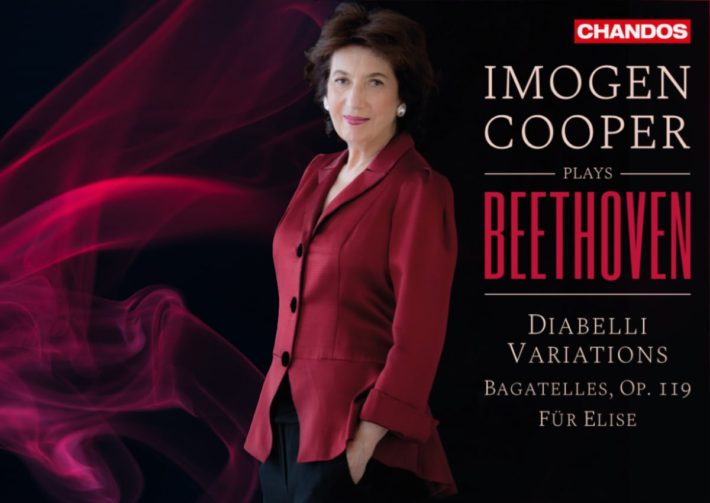This is something special. It shouldn’t be surprising to anyone following Imogen Cooper’s superb series of albums for Chandos in recent years, but Cooper exemplifies here again a lifetime of experience and depth of execution in the classical solo repertoire. But maybe it will come as a surprise that Cooper’s discography, to this writer’s knowledge, includes only one of Beethoven’s solo works – The Sonata Op. 101, released under another great series by this artist for the Wigmore Hall label. So this is also a sort of occasion, and not for the playing alone.

The album starts with a marvelous performance of the eleven Bagatelles, Op. 119. There couldn’t have been a better match with the variations, as this set is a bridge between the old and the new, with about half of the Bagatelles written early in Beethoven’s composition career, and the other half closer to the Diabelli variations (this set also includes two “afterthought” to the bigger work). Cooper’s way with the set is of a complete cycle, putting to rest the debate whether the Op. 119 is a single unit or a “two halves” creation, grouped together only for publication. The progression is very convincing indeed, with the key and mood changes projected as different angles of the same spirit, a great journey among a fascinating storyteller.
Since Alfred Brendel’s influential article, based on his Cambridge lecture in the mid 1980s, “Must Classical Music Be Entirely Serious” and even before it, the Diabelli Variations were used as a fascinating example of Beethoven’s sophisticated sense of humor, his unique usage of expectations and surprises in all aspects of his composition process. All very interesting of course, but occasionally this sense of humor has become a source of too much preoccupation and at its worse – a farce. Brendel’s own recordings of this piece – mainly his two digital versions, one from the studio and one captured live – are not obviously funny at all. The smile, if projected, is merely hinted.
Cooper’s attitude is not dissimilar, but bellies even more reserved cheerfulness combined with a greater beauty of tone and diverse pianism than her former teacher. The theme and first semi-march variation is a good example. Listen how subtle are the small questions and answers that fill this variation, or the tiny changes in voicing of chords and bass with every repeat. There is no banging about as on so many other distinguish versions, so powerful one can’t hear any of the tonal colors we find here. The legato variations, often coming in as a relief, is almost dramatically changing the character of the musical flow (Var. 3, 14, 29-31).
The humor, when arrives, is tender, almost ironic, as in variation 13 and 15. These two variations were much more outwardly accented in Andras Schiff’s and Martin Helmchen’s versions, to name just two late outstanding takes. You will have to decide who tells the joke better:
Another impressive element of this performance is Cooper’s ability to sustain a consistent tempo within the cycle, without sounding one bit mechanical, a problem Maurizio Pollini’s otherwise technically impressive account suffered from. There is a subtle fluctuation of tempo to be suitable for each variation, but the general feel is of a coherent whole, from the opening theme until the last variation.
The minor variations (No. 29-31) is painfully simple, with yet again remarkable pianism – How Cooper manages to create this kind of slow detached notes in the right hand on Var. 29 will remain a mystery, while the legato that follows on var 30 will sure to melt some hearts.

When all is done, there is a sense of greatness here; of the performer, who knows the ins and outs of the score but resists the temptation to lecture it; of the composer and, most importantly, the greatness of the composition, a testament to a great artist at play.
Superb recording quality as well, produced by Rachel Smith and recorded on Snape Maltings Concert Hall. One quibble is the encore – Für Elise”, This annoying of all unauthorized pieces by Beethoven. It will come as a detractor after the superb Diabelli performance, so you will want to run for the stop button after the last chord of the variations. The performance itself of this (unfortunately) famous piece is, needless to say, flawless.
Beethoven – 11 Bagatelles Op. 119, Diabelli Variations, “Für Elise”
Imogen Cooper – Piano
Chandos Records, CD CHAN 20085




















